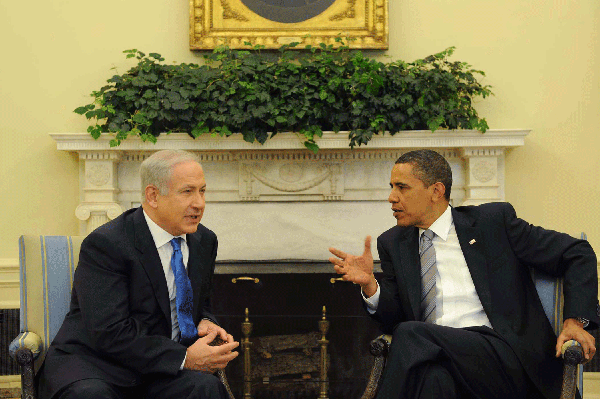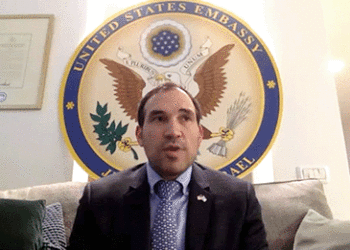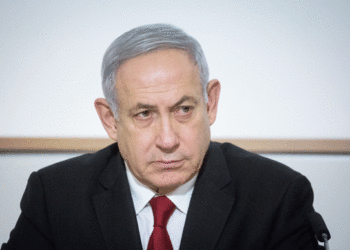Â
Israeli Prime Minister Benjamin Netanyahu did not quite endorse Palestinian statehood in his first White House meeting with President Barack Obama.
Haaretz, the Israeli daily, reported: “Netanyahu, in his remarks, reiterated that he supported self-government for the Palestinians but made no mention of a state, a position underscoring a rare rift in U.S.-Israeli relations.”Â
Following the meeting, Netanyahu told Israeli reporters at Blair House that the topic of Iran “consumed most of hour private one-on-one meeting. It was clear that he [Obama] understands the extent of the problem, for the world as well as for us, and he is committed to preventing Iran from gaining nuclear weapons.”Â
Of course, pundits of varied stripes weighed in about the meeting of the new Israeli premier and the new U.S. president. Several Jewish World readers forwarded the Jeffrey Goldberg column, “Israel’s Fears, Amalek’s Arsenal,” from the New York Times on Saturday.
Goldberg explains where Netanyahu is coming from, vis-a-vis his intention to press Obama on the urgency of reining in Iranian power. He writes that he asked an adviser to Bibi “to gauge for me the depth of Mr. Netanyahu’s anxiety about Iran. His answer: ‘Think Amalek.'”
After explaining the significance of Amalek, the ancient enemy of the Children of Israel, Goldberg writes:
“If Iran’s nuclear program is, metaphorically, Amalek’s arsenal, then an Israeli prime minister is bound by Jewish history to seek its destruction, regardless of what his allies think. In our recent conversation, Mr. Netanyahu avoided metaphysics and biblical exegesis, but said that Iran’s desire for nuclear weapons represented a ‘hinge of history.’
“’Iran has threatened to annihilate a state,’ he said. ‘In historical terms, this is an astounding thing. It’s a monumental outrage that goes effectively unchallenged in the court of public opinion. Sure, there are perfunctory condemnations, but there’s no j’accuse — there’s no shock.’ He argued that one lesson of history is that ‘bad things tend to get worse if they’re not challenged early.’ He went on, ‘Iranian leaders talk about Israel’s destruction or disappearance while simultaneously creating weapons to ensure its disappearance.’
“Mr. Netanyahu doesn’t believe that Iran would necessarily launch a nuclear-tipped missile at Tel Aviv. He argues instead that Iran could bring about the eventual end of Israel simply by possessing such weaponry. ‘Iran’s militant proxies would be able to fire rockets and engage in other terror activities while enjoying a nuclear umbrella,’ he said. This could lead to the depopulation of the Negev and the Galilee, both of which have already endured sustained rocket attacks by Hamas and Hezbollah.
“I have learned much from Jeffrey Goldberg, and generally admire what he does with his contradictions; but yesterday’s New York Times column on Benjamin Netanyahu is troubling on so many levels one hardly knows how deep to drill first,” Bernard Avishai wrote on Sunday. “Basically Goldberg is saying this: You may suspect (given Netanyahu’s record, presumably) that the prime minister is an ideologue and something of a manipulator, that he is actually committed to Greater Israel, and is throwing Iranian sand in our eyes, trying to distract us from the occupation and the settlements. But this would be wrong.
“Netanyahu, Goldberg continues, truly does believe that Iran is a threat to Israel’s very existence, and he believes this for three reasons: strategic, Jewish, and familial. I, Goldberg, do not necessarily believe these things myself, but I have access to Netanyahu and his strategic planners, a purchase on the way Israeli Jews think, and a sympathetic grasp of his family dynamics. So I’m going to explain him to you.”
You can read Avishai’s full blog post — and Goldberg’s column, too. I’ll just add that Avishai mentions that there are “plenty” of Israeli strategic planning professionals, “from former intelligence boss, Ephraim Halevy, to former Chief of Staff Amnon Lipkin-Shahak, who think an attack would be madness, however uncomfortable it might be to live with a nuclear Iran.” — Mordecai Specktor
Update — Tuesday, May 19
In a Salon.com article, Gary Kamiya predicts that Obama and Netanyahu are about to butt heads, so to speak:
Forget the diplomatic niceties both men uttered after their meeting. The stage is set for a head-on collision between Obama and Netanyahu. For the first time since 1991, when President George H.W. Bush dared to stand up to far-right Israeli Prime Minister Yitzhak Shamir, making U.S. loan guarantees conditional on Israel’s stopping illegal settlement building in the occupied territories, there could be a major rift between the U.S. and Israel.
Kamiya notes that Obama is a centrist and that “American politicians have about as much appetite for confrontation with Israel as they do for supporting world communism.” Nonetheless, the author argues that there are “two compelling reasons why Obama should stand up to Netanyahu, and probably will. As a foreign-policy realist, unswayed by irrational ideological attachments, he understands the vital necessity of brokering an Israeli-Palestinian peace. And he knows that the domestic political winds have shifted enough that he can get away with confronting an Israel increasingly perceived as intransigent, addicted to force and on the wrong side of history.”
The domestic political terrain also has been altered with the heightened profile of groups like J Street and the Israel Policy Forum, according to Kamiya, which ostensibly creates support for the new U.S. president “brokering an Israeli-Palestinian peace.” However, the writer does not touch on the issue of the bitter Hamas-Fatah internecine conflict, which presumably must be patched up before anybody can broker a negotiated settlement between Israel and Palestine. — M.S.
Â
Update — Wednesday, May 20
Regarding my comment above on the Hamas-Fatah rift — the Palestinians’ “two-state solution” — JTA reports today that Shin Bet chief Yval Diskin told a Knesset panel on Tuesday that any peace process between Israel and the Palestinians is impossible as long as Hamas remains in control of Gaza.
Here’s the full JTA news brief:
JERUSALEMÂ (JTA) — A peace process will be impossible as long as Hamas controls the Gaza Strip, Israel’s Shin Bet chief said.
Yuval Diskin told the Knesset Foreign Affairs and Defense Committee Tuesday that there is no way to have a sustainable peace unless there is a Palestinian unity government, not like now with Gaza run by Hamas and the West Bank run by the Fatah-led Palestinian Authority.
“Hamas will never relinquish its hold on Gaza and the P.A. will never relinquish the West Bank,” he said. “A unity government will form only under extreme international pressure.”
Diskin also said that if the Palestinians were to hold elections now, it is likely that Hamas would win. He added that the reason Hamas has maintained quiet in Gaza is to give itself time to rearm.
Diskin also commended the Egyptians for working to stop smuggling into Gaza.
Regarding Hamas winning Palestinian elections, Mahmoud Abbas, president of the Palestinian Authority, unveiled a new government on Tuesday that completely excludes Hamas. Al Jazeera reports that half of the Cabinet members are from Abbas’ Fatah faction:Â
The rival factions have been on a collision course since Hamas forces ousted Abbas loyalists from the Gaza Strip in June 2007.Â
Hamas has since been running the Gaza Strip while Western-backed Abbas has been in charge of the West Bank.
Lamis Andoni, Al Jazeera’s Middle East analyst, said: “The cabinet was formed in spite of objections from several Fatah leaders and opposition by Hamas to the idea of the re-appointment of Salam Fayyad.
“Several Fatah leaders expressed serious concern that the formation of the new government would hurt reconciliation talks with Hamas. [They]Â are worried that the formation of the government would stall or hurt the talks.
“However, most of the new ministers are known supporters of reconciliation with Hamas.” Andoni said.
“Some, like Lamis Alami and Ali Al Jarbawi, are former members of the independent Palestinian commission on human rights. The commission documented violations by both the PA and Hamas.”
  Â
Agreement between the two Palestinian factions is vital for the reconstruction of the Gaza Strip, left in ruins by Israel’s 22-day offensive last December and January that killed more than 1,400 Palestinians and 13 Israelis.



















